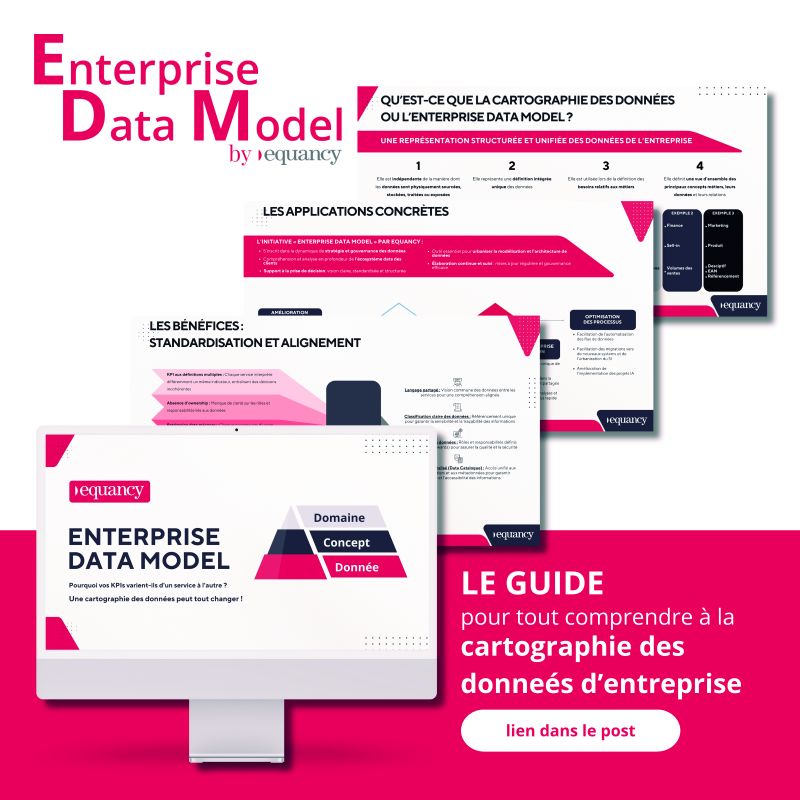Improve understanding of data governance to identify its role in the challenges of accelerating transformations and enhancing the value of data
Data is omnipresent and is increasingly interfering in the daily life of companies. And yet only 24% of companies are data-driven, according to a 2021 Alteryx study. One of the fundamental reasons for the difficulties encountered in this data transformation is the lack of data governance. A goldmine of information, data should be considered as a company's asset in the same way as its human, real estate or financial resources, and yet data governance is a new subject for many companies, except for banks and insurance companies, which were forced by regulations to deal with the subject well before other industries. The first step in moving forward on this subject is to define what data governance is, its scope, make this new, multi-faceted concept concrete and clarify the tangible impacts and benefits that can be expected from such an initiative. Starting with top management, who may see these initiatives primarily in terms of their cost without really perceiving the benefits, even though they are numerous and multiple.
Governance to orchestrate
The ultimate goal of data governance is to facilitate access to and use of quality data within a framework that limits risks, cyber risks and risks of non-compliance with regulations such as the RGPD. In short, the purpose of a well-functioning data governance is to succeed in classifying data according to clearly established norms and standards within the company in order to better understand and apprehend it and make it available to users who have the right and need to use it in a secure and legal framework.
Data governance helps, through various professions (which we will list in a future article), to facilitate access to the data that passes through the company by making it easily usable. This objective is based first of all on an organisation (people with clearly defined roles and responsibilities around the data), processes and standards (for managing repositories, access rights, documentation, quality control) and rules (legal, security constraints, ethics of data use specific to each company).
Effective governance will thus have several benefits:
- Increased operational efficiency: I can get through my regular tasks more quickly thanks to easily exploitable, high-quality data, and my projects are deployed more quickly because I have a better grasp of my data assets and the key contacts to call on when I have a question.
- Faster and better informed decisions thanks to the availability of useful data to the right decision-makers, in the right format, recently updated with a high degree of reliability
- Continuous improvement in the performance of my use cases using data: better and richer data improves the accuracy of my targeting, my prediction models... and consequently the performance of the actions that rely on these data and algorithms.
- A reduction in the risks linked to data leaks and non-compliance with legislation, which can be considerable, as demonstrated by the recent cyber attacks and the latest fines from the CNIL
Data governance is therefore a means of supporting the company's primary mission: performance, increased turnover and margin, and operational efficiency. It often comes after a first stage of data transformation when the number of use cases, the number of users and the number of data sources exploited start to become very significant and the value of the use of data has been demonstrated.
The 5-pillar law
The five pillars we have summarised above represent the major areas of work for successful data governance.
As with any transformation project, internal communication and team adoption are key to ensuring the success and sustainability of the project. This involves clarifying the benefits for everyone, the business lines, IT and the data teams, knowledge of the data assets, identification of the opportunities offered by data to be more efficient and innovative in each business line. The role of the change management and acculturation system is therefore key to the successful deployment of data governance.
As the challenges and topics are often numerous, it is essential to regularly redefine both the scope (all data, or data from a domain such as finance, HR, product) and its priorities (documentation, quality and acculturation), especially on the most impactful pain points of data transformation. This is specific to each company even if the topic of data governance is a valid one in all business sectors.
Data governance is no longer a need for large groups in the banking and insurance sectors (the precursors constrained by financial regulations), it has become a necessity for any company that is developing, and is now essential in the acceleration of companies' data transformations.
Didier Richaudeau
Data associate




